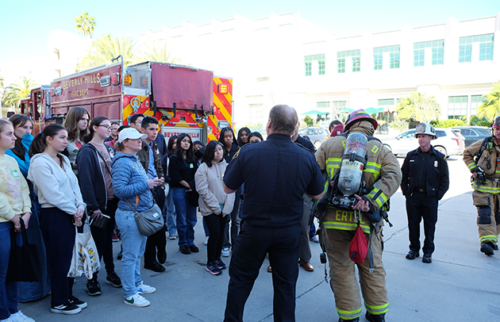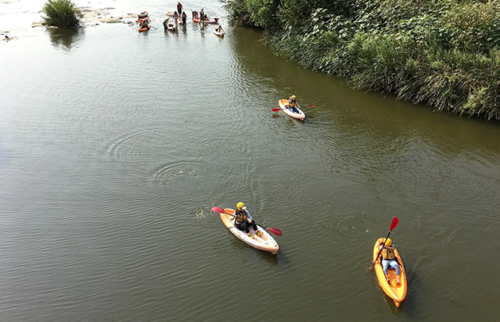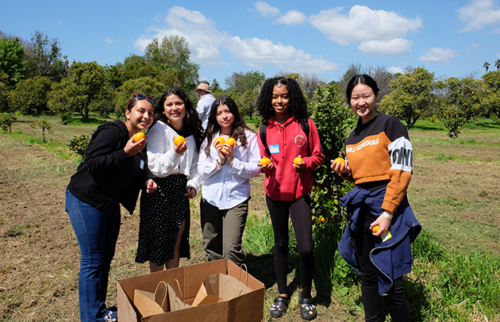
LA, at your service: Teens get an inside look at the institutions and agencies behind life in the City of Angels
On a rainy day in March, high school teens from across Los Angeles County convene at the downtown branch of the L.A. County Library to dive into the sensitive topic of policing.
The students, participants in the Los Angeles Service Academy (LASA), first peruse books on historical community activism against police overreach. Then they hear from Richard Tefank, a career police officer who is now the executive director of the Los Angeles Police Commission, on the complexities of managing urban crime.

It was an eye-opening experience for the students, whose high school years have been marked by nation-wide discussions over police brutality. Thanks to citizen activism, many police departments, including L.A.’s, sustained budget cuts so cities could fund community initiatives instead.
For LASA student Zoe Kramar, this shift in funding priorities was an inspiring demonstration of the power citizens can have to shape city policy. Yet, listening to Tefank speak about the impact of these budget changes also revealed the complex ripple effects of activism.
“Hearing about the consequences of shrinking the LAPD funds clearly demonstrated the nuance of social justice reforms,” she said afterward. “This really made me reflect on not just the importance of social justice advocation, but also on the weight of civic responsibility, as our actions could have legitimately damaging consequences.”
Building Angelenos
Kramar’s insight into the complexities of civic life is precisely what LASA, which celebrates its 10th anniversary this year, was designed to spark. The program began in 2013 when historians Doug Smith and William Deverell, professor of history, spatial sciences and environmental studies, realized that, as academics and historians, they had little direct impact on high school students.

“We wanted to work with teens, their ideas, and their knowledge of our city, our region and their neighborhoods,” says Deverell, founding director of LASA and director of the Huntington-USC Institute on California and the West, which administers the program.
He and Smith launched LASA as a weekend academy for high school juniors to teach them about the civic life of their city. It was designed to reach teens at a crucial point in their lives: age 17, the year many get their driver’s licenses and the year before they achieve voting age.
The program is free, but students must apply. They come from across the county and from a wide range of backgrounds, which means that participating in the program also introduces them to a diverse group of peers.
On Saturdays over the course of one school year, students receive hands-on learning about a different element of life in L.A. Topics range from wildfire management to public health to the entertainment industry. They might kayak down the Los Angeles River, pick fruit at The Huntington Library, Art Museum, and Botanical Gardens, tour the Port of Los Angeles or take a peek behind the scenes at Warner Brothers Studios.
Model citizens
The program offers some pretty exceptional access to L.A.’s movers and shakers.
“At LASA, students get to meet people who plant seeds for where they might fit in the city,” says Elizabeth Logan, executive director of LASA.

Eleanor Veitch, who grew up 20 minutes northeast of downtown L.A. in Altadena, completed LASA in 2021 and now attends Yale University. Her experience at LASA, which included a Zoom session between then L.A. Mayor Eric Garcetti, helped strengthen her identity as an Angeleno — and helps her rise to its defense on an East Coast campus where jokes about Los Angeles’ traffic and sprawl abound.
“It wasn’t until I got to college and was surrounded by people who weren’t also from Los Angeles that I realized how important it is to me, and how big a role it had played in shaping my identity,” she says. “LASA gave me the words to articulate that and to be able to talk about Los Angeles intelligently with my peers.”
Fellow alumnus Patrick Hudnut agrees that LASA helped him better understand his hometown. “LASA feels like a key to the city,” he says.
He also believes it shapes teens into better citizens. “The idea of the citizen has greatly eroded, much to our society’s detriment. LASA helps you understand how much it takes to run a city like Los Angeles, that it’s not a given, and that everyone needs to do her part,” says Hudnut.
He’s taken the lesson to heart. After graduating from Ohio’s Kenyon College, Hudnut is now a project manager and organization administrator for the Hollywood Food Coalition (HoFoCo), a nonprofit organization dedicated to alleviating food insecurity in L.A. County.
Thanks in large part to the civic values instilled in him by LASA, Hudnut chose to pursue a career in public service and, having volunteered at HoFoCo in grade school, returned to the organization as a staff member after graduating from college during the pandemic. In 2021, he became the first alumnus to return to LASA and lead his own Saturday session, focusing on food insecurity and HoFoCo’s work feeding Angelenos in need. He has spoken to the students of LASA each year since.
His story is an example of the integral role LASA can play in shaping teens’ lives.